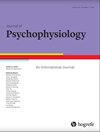学生在回忆人际压力记忆过程中的收缩及其与负面情绪增加的关系
IF 0.9
4区 心理学
Q4 NEUROSCIENCES
引用次数: 4
摘要
摘要瞳孔直径的变化是情绪处理的标志。关于瞳孔反应和情绪的大多数先前发现都报道了瞳孔在几秒内对情绪感知刺激(例如视觉图像)的呈现做出反应而放大。人们认为,这种刺激会激活交感神经系统,导致瞳孔扩张。为了检验与日常情绪体验相似的情绪对情绪的影响,本研究在回忆日常生活中的紧张人际事件时,考察了瞳孔直径的变化及其与主观情绪变化的关系。对20名大学生(男11名,Mage=20.36±2.38岁;女9名,Mage=22.33±3.57岁)的数据进行了分析。在实验任务中,参与者被要求通过监视器上的指示和问题回忆他们对该主题的记忆,监视器按照自己的节奏通过按键进行。随后,在基线和指导期结束后,参与者被要求自由回忆自己的记忆。然后,他们被要求安静地回答一系列关于自由回忆的问题。在分析中,我们比较了这些不同时期的瞳孔直径,并观察到与自由回忆或基线时期相比,瞳孔直径在反应时期显著降低。此外,反应期内瞳孔收缩与负面情绪量表得分的增加呈负相关。瞳孔收缩表明觉醒水平和副交感神经激活降低,可能是由多种因素引起的,包括认知困难较小和实验任务时间相对较长。由于反应期的紧张模式较少,参与者的注意力可能更成功地集中在正在进行的任务上,这可能会导致回忆的最佳表现,可能会导致瞳孔直径和负面情绪变化之间的相关性。本文章由计算机程序翻译,如有差异,请以英文原文为准。
Pupil Constrictions and Their Associations With Increased Negative Affect During Responses to Recalled Memories of Interpersonal Stress
Abstract. Pupil diameter change is indicative of emotional processing. Most previous findings regarding pupillary response and emotion have reported that the pupil enlarges in response to the presentation of emotional perceptual stimuli (e.g., visual images) within several seconds. It is considered that such stimuli activate the sympathetic nervous system, leading to pupil dilation. In order to examine the effects of emotions similar to daily emotional experiences of mood, the present study examined pupil diameter changes and their relationships with subjective emotional changes while recalling a topic of stressful interpersonal events in daily life. The data of 20 university students (11 males, Mage = 20.36 ± 2.38 years; 9 females, Mage = 22.33 ± 3.57) were analyzed. In the experimental task, participants were instructed to recall their memories concerning the topic through instructions and questions presented on a monitor, which proceeded at their own pace, through a key press. Subsequently, after baseline and instruction periods, participants were instructed to freely recall their memories. They were then asked to respond silently to a series of questions concerning the freely recalled memories. In the analysis, we compared the pupil diameters between these different periods and observed that pupil diameters significantly decreased during the response period relative to the free recall or baseline periods. Furthermore, pupil constrictions during the response period were negatively correlated with increases in negative affect scale scores. Pupil constriction, which is indicative of decreased arousal level and parasympathetic activation, was presumably caused by multiple factors including less cognitive difficulty and a relatively long experimental task period. As the result of a less tonic mode in the response period, the attention of participants might be more successfully focused on ongoing tasks, which might lead to optimal performance in recalling memories, possibly leading to correlations between pupil diameter and negative emotional changes.
求助全文
通过发布文献求助,成功后即可免费获取论文全文。
去求助
来源期刊

Journal of Psychophysiology
医学-神经科学
CiteScore
2.60
自引率
7.70%
发文量
25
审稿时长
>12 weeks
期刊介绍:
The Journal of Psychophysiology is an international periodical that presents original research in all fields employing psychophysiological measures on human subjects. Contributions are published from psychology, physiology, clinical psychology, psychiatry, neurosciences, and pharmacology. Communications on new psychophysiological methods are presented as well. Space is also allocated for letters to the editor and book reviews. Occasional special issues are devoted to important current issues in psychophysiology.
 求助内容:
求助内容: 应助结果提醒方式:
应助结果提醒方式:


